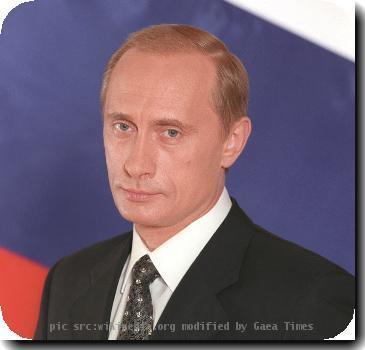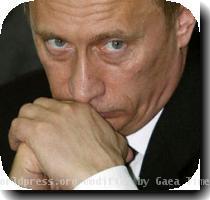AP Exclusive: Lawyer’s letters tell of ordeal before his death in Russian prison
By Nataliya Vasilyeva, APTuesday, December 1, 2009
AP Exclusive: Letters tell of Moscow prison ordeal
MOSCOW — The letters are neatly folded and written on soft white paper in a confident, elegant hand. They tell a story of horror in the bowels of the Russian prison system, a saga set against the backdrop of the world of multibillion-dollar investment funds in Vladimir Putin’s Russia.
Sergei Magnitsky, a lawyer for a London-based fund that was once the biggest in Russia, wrote to his mother of wasting away from an agonizing illness without proper medical care in a crowded Moscow prison cell that reeked of sewage.
Just 11 days after the last letter reached her, Magnitsky died while awaiting trial on tax-evasion charges. He was 37.
Magnitsky’s story hit a nerve in Russia, where memories linger of the millions who died of cold, starvation and neglect in the harsh Soviet gulag. Two of Russia’s biggest independent business dailies ran a front-page story when he died, and President Dmitry Medvedev has called for an investigation. One prison official has accepted some responsibility for the squalid conditions.
In an exclusive interview, Magnitsky’s mother showed The Associated Press a series of letters from her son detailing his ordeal in Butyrskaya prison, notorious for its harsh conditions.
Nataliya Magnitskaya said she was only allowed to visit him once at Butyrskaya during his 11-month imprisonment and found him emaciated and exhausted. On Nov. 17, as she brought him a parcel of food, officials told her he had died 12 hours earlier.
“Living conditions here are worse than anywhere I’ve been before,” read one of Magnitsky’s letters, postmarked Aug. 13. The prison is a 30-minute drive from his home, but it took two months to arrive, she said.
Prison censors blotted out a few phrases in some letters — but they are still legible. In one of those passages, Magnitsky describes prison walks: inmates were taken to a small concrete courtyard with no grass or trees.
She said Magnitsky “wasn’t asking for some luxury. … He was merely asking for what he was entitled to.”
“He was so young. I still can’t believe he’s dead,” said the 57-year-old teacher, standing in a frigid Moscow park. She has been living with Magnitsky’s wife and sons, ages 8 and 17, during most of his detention.
Magnitsky was arrested in November 2008 on tax-evasion charges linked to his work with Hermitage Capital Management, run by U.S.-born British investor William Browder.
The Magnitsky case has drawn comparisons to that of Mikhail Khodorkovsky, once Russia’s richest man, now serving eight years in prison on tax-evasion charges in what Kremlin critics describe as punishment for his political ambitions.
Friends and associates believe the charges against Magnitsky were trumped up and that he was really jailed because he had worked with Browder in campaigns to stem corruption in Russia’s bureaucracy and its massive conglomerates, many with strong links to the state.
Browder was expelled from Russia four years ago on vague grounds of national security concerns. Magnitsky had helped defend Hermitage and its partner HSBC against an alleged multimillion-dollar fraud and forgery plot by officials with the Interior Ministry.
Magnitsky said he was pressured to give false evidence against Browder.
“The investigators repeatedly proposed that I testify against William Browder in exchange for ‘a suspended sentence during the trial’ and freedom,” he wrote in a petition to the lead investigator. “Every time, when I repeatedly rejected these propositions by the investigators pushing me to be dishonest, the conditions of my detention become worse and worse.”
The Interior Ministry has denied all allegations of abuse and said it would not comment on Magnitsky’s conditions in prison. The ministry’s investigators said last week they had known nothing of Magnitsky’s health problems.
Magnitsky spent four of the last months of his life at Butyrskaya, which dates back to the 17th century, although some buildings in the complex are not as old. His family and supporters say he was never properly examined by a doctor there.
When Magnitskaya mailed her son a parcel with medicine for his pancreatitis, an inflammation of the pancreas, it took four weeks for prison authorities to deliver it. The pain was so acute, Magnitsky wrote her, that he was unable to lie down. When a cellmate pleaded for medical help, the doctor came only five hours later, he wrote.
Magnitsky spent 10 days in a cell with windows with bars but no glass to protect him from the late September Moscow cold. His mother waited for hours outside the prison to pass him food and medicine, but for the first 10 months, Magnitsky was not allowed visitors.
In his final days of life, he was transferred to another Moscow prison, Matrosskaya Tishina, to be treated for his illness because there was no proper facility at Butyrskaya. When his mother went to Butyrskaya on Nov. 17, she was told to go to Matrosskaya Tishina but was not given a reason. When she went there, she was told he had died the previous day.
Unusually for a case involving conflict with the Kremlin, Magnitsky’s death received widespread and critical coverage — even in the state-controlled press.
One of Russia’s two biggest independent business dailies, Vedomosti, has published at least five opinion pieces by columnists and independent analysts condemning prison officials for their alleged neglect.
“They did him in,” read the headline of one of the columns.
“He died of Butyrka,” said another, using the prison’s colloquial name.
One prison official took the rare step of accepting some responsibility for the squalid conditions in which Magnitsky was kept.
Alexander Smirnov, deputy head of the Federal Penitentiary Service, told Russian media there had been “visible violations on our part” at Butyrskaya. “We are not going to minimize our guilt in any way — it is definitely there.”
But Magnitsky had powerful enemies, his friends and colleagues say, and there is no guarantee that anyone will ever be punished for his death.
“Unless there is some type of an independent body that investigates it, it’s very unlikely that any real truth is going to come out of it,” Browder said in a telephone interview from London.
The Magnitsky case is “very disturbing” and raises “massive concern about what happens in places of detention in Russia,” said Alison Gill of Human Rights Watch in Moscow.
“The Russian government is obliged to carry out an investigation into this death because, according to international standards, when somebody dies in state custody, the burden is on the state to disprove the wrongdoing,” she said.
But she expressed doubt about the investigation. “To find out that Magnitsky was buried before the autopsy was conducted certainly raises very serious questions about how meaningful an investigation is going to be possible,” she said.
Magnitskaya said she never realized her son was in danger before his arrest, even though he worked for a foreign investor who has accused ranking Russian police officials of corruption. He refused to flee the country, as some urged him to do, because he had faith that Russia was on the path to the rule of law, she said.
“He believed that laws in our country are working, and this will all get straightened out,” Magnitskaya said. “He never wanted to leave Russia.”
Jamison Firestone, Magnitsky’s former boss at the law firm Firestone Duncan LLC, said his pleas to the General Prosecutor’s office and Medvedev on Magnitsky’s behalf “were refused with no investigation.”
Firestone said he had warned Magnitsky that his work had put him in danger, but Magnitsky replied that Firestone was watching too many movies — that the time of Stalinist purges was over.
Magnitskaya last saw her son in court Nov. 12, four days before he died. She said he looked frail and frustrated, but still full of life.
“What happened during those four days that we didn’t see him?” she asked.
Despite his ordeal, Magnitskaya said she hopes her son’s death will serve a purpose.
“I hope that conscience hasn’t entirely died in those people,” she said. “Perhaps, Sergei’s death will save somebody else’s life.”

